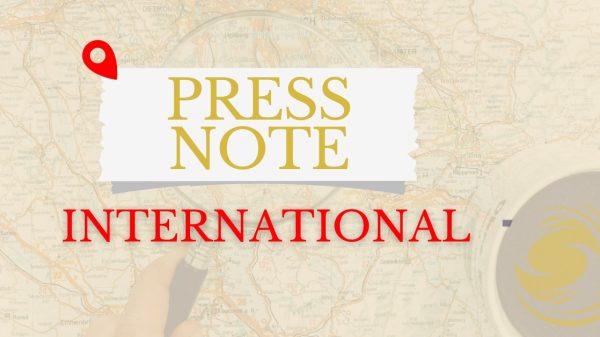Australia and Britain sign long‑term AUKUS submarine treaty

Thai‑Cambodian border clashes intensify despite ceasefire calls
Reuters,
Fighting on the Thai‑Cambodian border spilled into a third day as both sides traded artillery fire and opened new fronts despite international appeals for calm. The clashes, sparked by a deadly skirmish in May, have killed at least 30 people and displaced more than 130,000, making them the worst hostilities between the neighbours in 13 years. Thailand’s navy reported gun battles in the coastal province of Trat, more than 100 km from earlier flashpoints, while Cambodian authorities accused Bangkok of deliberately expanding the conflict and called for condemnation of what they termed an unprovoked attack. Bangkok said Cambodia had planted land mines on its territory and urged Phnom Penh to stop “internationalising” the dispute. The standoff centres on undemarcated stretches of the 817‑km border near the ancient temples of Ta Moan Thom and Preah Vihear, and comes amid long‑standing tension over sovereignty and historic grievances dating back decades.A
ustralia and Britain sign long‑term AUKUS submarine treaty
Reuters,
Australia and Britain have signed a bilateral treaty to cooperate for 50 years on the AUKUS nuclear‑powered submarine programme, deepening defence ties aimed at countering China’s influence in the Indo‑Pacific. The so‑called Geelong Treaty, signed by Australian Defence Minister Richard Marles and British Defence Secretary John Healey, will cover the design, construction, operation and disposal of next‑generation SSN‑AUKUS submarines. The pact builds on the 2021 AUKUS agreement between Australia, Britain and the United States, which aims to provide Canberra with nuclear‑powered attack submarines from the 2030s. Britain’s defence ministry estimates the treaty could generate up to £20 billion in exports over 25 years, while Australia has committed A$368 billion over three decades to the programme. The signing coincided with the Talisman Sabre war‑games involving 40,000 troops from 19 countries, underscoring the broader push to strengthen military cooperation across the region.
China proposes global organisation to govern artificial intelligence
Reuters,
At the World Artificial Intelligence Conference in Shanghai, Chinese Premier Li Qiang called for creating a new international organisation to coordinate AI development and regulation. He argued that governance of the transformative technology remains fragmented and warned that AI risked becoming “the exclusive game” of a handful of countries if left to market forces. The proposed body would encourage sharing advances and equal access, particularly for the Global South, and could be headquartered in Shanghai. Li said Beijing would release an action plan inviting governments, companies and research institutions to contribute to a cross‑border open‑source community. His appeal comes as Washington pursues its own AI blueprint and maintains export restrictions on advanced chips; Li did not name the United States but cautioned against using technology for geopolitical dominance, emphasising that global coordination is needed to develop common rules and address supply‑chain bottlenecks.
Italy’s Meloni warns against premature recognition of a Palestinian state
Reuters,
Italian Prime Minister Giorgia Meloni told La Repubblica that she supports the idea of a Palestinian state but opposes recognising it before it is established. “If something that doesn’t exist is recognised on paper, the problem could appear to be solved when it isn’t,” she said, arguing that premature recognition could undermine prospects for lasting peace. Meloni’s comments follow France’s decision to recognise a Palestinian state at the UN General Assembly in September, which drew sharp criticism from Israel and the United States. Italy’s foreign minister has insisted that any recognition must coincide with Israel’s acknowledgment of a new Palestinian entity, while Germany has said it is not ready to support recognition and is focused on reviving negotiations toward a two‑state solution.
Five dead after militant attack on Iranian courthouse
Reuters,
Gunmen from the Sunni Baluch militant group Jaish al‑Adl stormed a courthouse in Zahedan, the capital of Iran’s restive Sistan‑Baluchestan province, killing at least five people and injuring 13. Iranian state media reported that three attackers died in an ensuing shootout with security forces, and a senior police official confirmed that a mother and child were among those killed when the assailants threw a hand grenade inside the building. The militant group claimed responsibility on Telegram and urged civilians to evacuate the area. A Baluch human‑rights organisation said several judiciary staff and security personnel were among the casualties. The province, home to Iran’s Sunni Baluch minority, has long been a hotspot of separatist and militant activity amid complaints of economic marginalisation. The attack underscores persistent instability near Iran’s borders with Pakistan and Afghanistan, where insurgent groups frequently clash with state forces.
Taiwan holds recall vote that could reshape its parliament
Reuters,
Taiwanese voters cast ballots on July 26 to decide whether to recall 24 lawmakers from the opposition Kuomintang (KMT), a campaign supporters say will send a message to China but opponents view as an assault on democracy. The vote — Taiwan’s largest‑ever recall — comes amid allegations of “unprecedented” election interference by Beijing, which claims the democratically governed island as its own. President Lai Ching‑te’s Democratic Progressive Party lost its legislative majority in the 2024 elections, and the recall could give it a chance to regain control. Recall organisers accuse KMT lawmakers of cosying up to China, underfunding defence and causing legislative chaos, while the KMT argues it is merely maintaining dialogue with Beijing and exercising legitimate oversight. Polls close at 4 p.m. local time (0800 GMT), with results expected later in the evening; additional recall votes are scheduled for next month.












